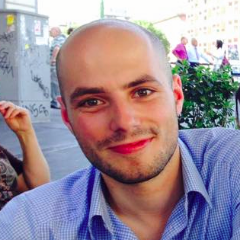Figures emerge from a shadowy forest, maids in smocks busily light gas lamps and a corpulent Duke guzzles wine from a chalice before peasants turn up with pitchforks and pans with a score to settle. While not known for his overt political views, Rossini was inevitably a child of his revolutionary times. (The French Revolution will have felt close to home when the composer's father was arrested as a suspected Napoleon sympathiser.) His opera Torvaldo e Dorliska (1815) is an especially good example of the prevailing taste for satire. Written one year after Beethoven revised Fidelio, the work's pastoral setting and plot – which sees Duke of Ordow imprison Torvaldo, his rival for the heart of Dorliska, the latter of which is ultimately liberated by townsfolk – make it a typical example of the politically-inclined semiseria genre.
Mario Martone's 2006 production has returned to the Rossini Opera Festival this year, and captures both the aesthetic and the spirit of the age. Costume designer Ursula Patzak dresses the cast in 19th-century garb, and the joyous scenes that erupt in the final scene mirror those that have been beamed onto television screens following the fall of tyrants in recent years.
The production is by no means technically perfect: dispersing singers over the stage and on a walkway surrounding the pit during ensemble numbers leads to imbalances. And the scene in which the Duke manhandles Dorliska raises giggles from the audience when really this should be harrowing. But overall this is a charming if unchallenging production that takes to the plot's comic elements with relish. A cage destined for Torvaldo that emerges from the walkway is a modest yet typical piece of mechanical wizardry from Martone, and the aria during which Ormondo climbs a tree to pick a pear and falls into the outstretched arms of members of the chorus is great fun.
Sadly, Salome Jicia in the role of Dorliska did not deliver the goods as expected. The young soprano had impressed with streaming vocalisation in ROF's production of La donna del lago last year, but here the voice lacked core in the lower and middle ranges, and sounded metallic up top. Dmitry Korchak was more impressive: his round, gleaming voice communicated an appropriate heroic quality in the role of Torvaldo. The tirelessly expressive Carlo Lepore, whose arm was suspended in a period leather sling, was wonderful in the comic role of Giorgio.
But it was Nicola Alaimo's Duke that stole the show. The enormous singer is a sort of baritonal Gérard Depardieu, who commanded attention as he marched down steps into the stalls, up ladders into the wings and chased Torvaldo around the walkway. While Alaimo's is not the largest voice, he shapes his lines with great musicality, and there is a pleasing naturalness in the way he chatters through recitative.
The Orcherta Sinfonica Giacomo Rossini is a scratchier band than the Rai orchestra, which has overseen proceedings in the other two main productions in this year's programme. Yet under the enterprising direction of Francesco Lanzillotta it was a hive of detail and energy. Joyously played and drolly staged, here was a performance to capture the essence of Rossini.




